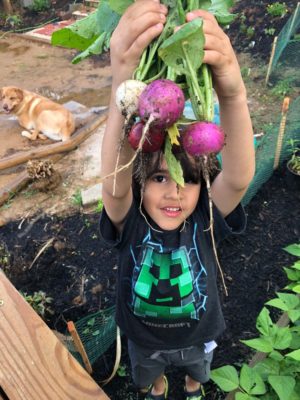Appalachian Resource Conservation and Development Council
“We’re looking for ways to empower communities and take back control.”
That’s how Lexy Close summarizes the driving force behind her work to address food insecurity. The U.S. Department of Agriculture defines food insecurity as “the state of being without reliable access to a sufficient quantity of affordable, nutritious food.” According to Close, food insecurity connects to struggles of disempowerment and exploitation that people in Appalachia have experienced for generations.
Close works with the Appalachian Resource Conservation and Development Council, a nonprofit group that serves six counties in East Tennessee. The council is focused on improving local economies through leadership and education.
Among the projects Close oversees is Appalachian Farmacy, which was modeled after a Kentucky program designed to make it easier for people experiencing food insecurity to access local and healthy food from farmers markets, benefitting both them and local farmers. Programs like these have seen successes and struggles.
In 2017, Appalachian Farmacy began “prescribing” fruits and veggies to recipients of the federal Supplemental Nutrition Access Program who have health issues such as obesity or heart disease. Although the Appalachian Farmacy supported roughly $50,000 in vouchers from grocery stores and the farmers market, it ended in March 2018. According to Close, the grant required that recipients provide a one-to-one funding match in order to re-apply, which the team did not have the resources to do.
A grant from the Tennessee Dept. of Health supported another farmers market initiative in 2018. Also inspired by a Kentucky program, this initiative supplied $3 vouchers for fruits and vegetables after recipients logged a mile of walking at the farmer’s market. Participants logged approximately 1,400 miles. Close explains that the program was a success, but the funding was limited to one year.
Grants are useful in proving that a project can be successful. But, according to Close, they are not sustainable and many nonprofits struggle to maintain programs due to the short-term nature of grant funding.
Close does work closely with Grow Appalachia, a foundation that supports gardening education projects in 6 states across Central Appalachia. Grow Appalachia project sites have grown over 4.4 million pounds of food since 2009. Close runs a gardening program that has received funding since 2014, and offers gardening education, materials and supplies, and classes on cooking and canning.
Close says the ARCD is pursuing relationships with other local foundations that might be interested in investing in longer-term funding for programs like Appalachian Farmacy. She advocates for more resources to be put towards preventative health measures that enable people facing health issues and food insecurity to consume more fresh fruits and vegetables. With longer-term funding, Close sees a future where more Tennesseans are able to eat healthy, local food.
Learn more at arcd.org
Related Articles
Latest News

Leave a comment
Your email address will not be published. Required fields are marked *





